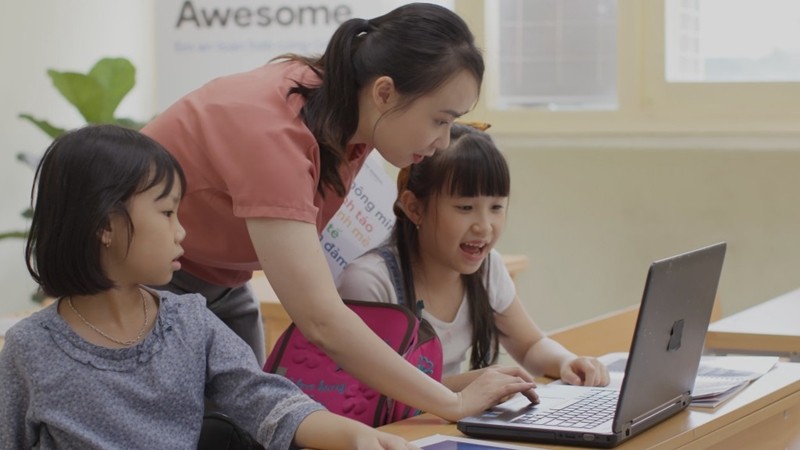
Education to prevent children from falling into "black hole" in virtual world: MOLISA official
Latest
 |
| Education to prevent children from falling into "black hole" in virtual world: Ms. Nguyen Thi Nga said that it is necessary to educate children to behave wisey and healthily in the virtual world. (Photo: Courtesy) |
Many potential risks in the cyber environment
In recent times, the Party, State and the entire political system have stepped in strongly to protect children on the Internet. Vietnam has built the legal system on protecting children in online environment, creating an important legal basis such as Law on Children, Law on Cyber Security, Law on Cyber Information Security, Law on Access to Information, etc.
Article 54 of the Children's Law specifically stipulates the responsibility to protect children in the online environment. Relevant agencies and organizations are responsible for communicating, educating and protecting children when participating in the online environment in any form. Parents, teachers and caregivers are responsible for educating children on knowledge and skills so they can protect themselves when participating in the online environment.
It must be affirmed that child protection in general and child protection in the online environment in particular is an interdisciplinary issue that requires the coordination of many sectors and the entire society. Besides having positive and useful information, there is a lot of negative information that has not been well controlled on social networks such as pornography, violence, drugs, negative behavior. Meanwhile, using phone everyday, children can easily access negative type of information, which can easily lead to distorted thinking and actions.
In addition, the spread of private information and online bullying negatively affects children's psychology, causing children to fall into a state of anxiety and panic, affecting their quality of life. In addition, the situation of seducing and luring children into acts of harassment, fraud, intimidation, illegal acts, and addiction to social networks, games on the Internet greatly affects their health, spirit, and mental health, children's lives and learning ability. From that situation, in my opinion, it is necessary to educate children on how to behave wisely and use social networks safely to avoid the risk of falling into "black holes" in the virtual world.
Help children behave wisely online
In 2019, Vietnam and ASEAN countries adopted the Declaration on the Protection of Children from all Forms of Online Exploitation and Abuse in ASEAN. In 2021, the Declaration on the Elimination of Bullying of Children in ASEAN was adopted, including bullying of children in the online environment.
In particular, the Declaration on the Protection of Children from all forms of online exploitation and abuse in ASEAN stated key measures such as: Promoting, building and implementing national legal frameworks in each member country, aiming to strengthen the principles of protecting children from all forms of online abuse and exploitation in ASEAN member countries.
In addition, Decision No. 830/QD-TTg dated June 1, 2021 of the Prime Minister also stated the main tasks and solutions, which are building and completing the legal corridor; education and communication to raise awareness and equip skills for children; deploy technical measures and solutions and apply technology; complete the organizational structure, improve law enforcement capacity, and strengthen international cooperation.
The important issue is to educate children on how to behave intelligently and use social networks safely. To do so, it is necessary to provide children with the necessary skills and knowledge so they can protect themselves and interact healthily in cyberspace. In other words, it is necessary to create resistance for children against harmful content in the online environment.
 |
| Education to prevent children from falling into "black hole" in virtual world: Protecting children in the online environment is the responsibility of the entire society. (Photo: dangconsan.vn/Thanh Ha) |
Currently, the risk of children being abused in the online environment is increasingly complex and unpredictable. Therefore, the role of family becomes more important than ever. In particular, parents need to guide their children on how to participate and access websites with healthy content. At the same time, parents also need to warn about the risks that children may encounter in cyberspace and how to handle them. More precisely, parents must be the "filter" of information for their children in the virtual world.
Parents need to cultivate knowledge and skills in educating children's ethics, personality, and rights. Furthermore, parents need to pay attention and encourage children to access websites with healthy content, warn them of risks children may encounter in the online environment and how to respond.
In addition, organizations providing information and communication products and services and organizing activities in the online environment must take measures to ensure the safety and privacy of children according to regulations of the law.
In addition, it is necessary to build and perfect the legal corridor; education, communication to raise awareness and equip skills; deploy technical measures and solutions and apply technology; perfect the organizational structure, improve law enforcement capacity; strengthen international cooperation.
In order for children do not become victims and encounter risks in the online environment, it is necessary to create habits and skills for children to use the network safely, helping them know how to prevent risks and dangers lurking in cyber world. Parents must help children know how to recognize harmful and inappropriate information and video clips, and how to control personal information. Schools have to include this advisory content in curricular or extracurricular activities to teach children about safe internet skills, possible dangerous circumstances and how to avoid them.
Nguyen Thi Nga, Deputy General Director of the Department of Child Affairs, Ministry of Labor, War Invalids and Social Affairs (MOLISA).













